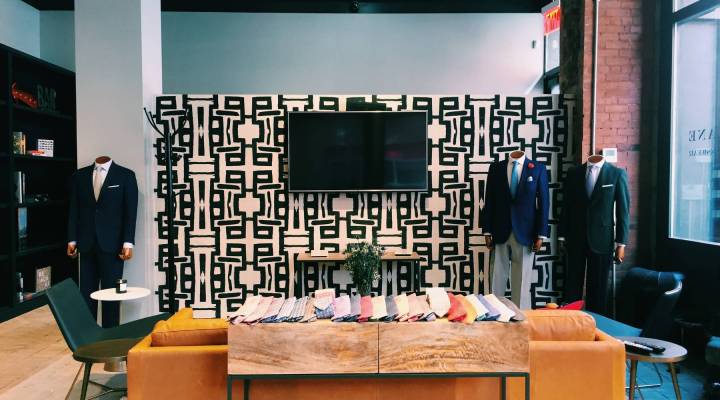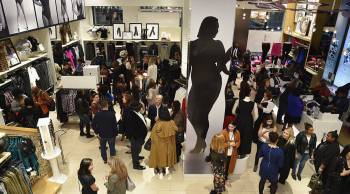
Alton Lane CEO doesn’t want shopping to feel like shopping
Alton Lane CEO doesn’t want shopping to feel like shopping

Today’s retail landscape is full of companies trying to find a way to keep customers coming to brick-and-mortar stores, but Colin Hunter’s company is going after customers who may not be all that interested in shopping in the first place. Hunter is the CEO and co-founder men’s clothing retailer Alton Lane, which uses data, technology and the idea that clothes shopping isn’t most men’s idea of a good time in order to find an edge. Marketplace host Kai Ryssdal spoke to Hunter about his company. The following is an edited transcript of their conversation.

Colin Hunter, left, and Peyton Jenkins, the co-founders of Alton Lane.
Kai Ryssdal: Give me the elevator pitch for this thing.
Colin Hunter: Yes, so we are a an upscale menswear brand that is all about making shopping less painful for men.
Ryssdal: Amen, right there.
Hunter: Perfect.
Ryssdal: Tell me though why you felt you needed to do this. I mean, give me the the business model, give me your advantage in the marketplace, if you will. And then tell me why.
Hunter: Yeah, you know, it’s really quite simple. When we looked out at the menswear space, we saw this multibillion-dollar global industry that wasn’t taking into account this basic truth that we all know, that most men hate to shop. But every guy still wants to look good. And so we said, “Let’s actually break down the industry and build it back up the way that makes sense for the consumer and doesn’t necessarily make sense for the fashion industry.” So all of our stores are private one-on-one appointments. You have a dedicated style expert working with you. We have full bars, flat screen TVs, secret rooms. We utilize 3D body-scanning technology to capture over 300 measurements in about 30 seconds. And what that does is it allows our tailors around the world to actually see your body when they’re creating your garments. And it delivers a better fit than what you might find somewhere else.

Alton Lane offers one-on-one appointments where customers have a dedicated style expert, as well as access to a full bar, flat screen TVs and secret rooms.
Ryssdal: And I can’t be the first guy to say this to you: It sounds a little bro-y and man-cavey.
Hunter: I think it doesn’t when you go into our space. You know, all the components that I’m talking about, good lighting, great drinks, you would expect that, you could expect that in a bar, you could expect that are super high-end hotel.
Ryssdal: What you’re offering here then clearly is a high-end product.
Hunter: It is a high-end product, but we start at accessible price points. And that was really important to us. Our custom shirts start at $99. Our custom suits start at $600. With that said, we never want customers to have to graduate from our brand. And so you can get a suit that’s $10,000 from us, and we have fabrics with crushed diamond or crushed gold blasted into the wool as it’s being woven. It’s not a cheap product. We view it as an investment.
Ryssdal: Fair enough. I’m a public radio guy. Five hundred bucks sounds like, you know, it sounds like a lot for a suit, but I wear khakis and a T-shirt to work every day.
Hunter: Sure.
Ryssdal: Once you get me scanned and whatever in that booth, and then you have my orders, and in theory you know where I work and I live because you’re going to mail it to me, it occurs to me you have a whole lot of data about me.
Hunter: That’s right.
Ryssdal: How worried ought I be?
Hunter: Not worried at all in terms of privacy. We take the privacy of our clients very seriously. We view data as a mechanism to improve the customer experience. I might shop at a store like J.Crew 18 times over the past few years, you know, picking up things here and there. Every time I walk into that store, it’s as if I’m a brand-new customer. So for us, we want to use that data. Not just your measurements and your style preferences, but your demographic data. Do you travel for work all the time? And therefore, let’s really show you fabrics that don’t wrinkle.
Ryssdal: Is this a retail clothing company or is it a technology company?
Hunter: I view us more as an experience company that’s powered by data and technology. It doesn’t have to stop at clothing. We’ve made recommendations for honeymoons, for trips, for restaurants, and we’re even able to see different trends of like-for-like customers within a city, within different neighborhoods, across various cities. There are some really interesting things that we can do down the road.
Ryssdal: So all right, that data is a powerful thing.
Hunter: Absolutely.
There’s a lot happening in the world. Through it all, Marketplace is here for you.
You rely on Marketplace to break down the world’s events and tell you how it affects you in a fact-based, approachable way. We rely on your financial support to keep making that possible.
Your donation today powers the independent journalism that you rely on. For just $5/month, you can help sustain Marketplace so we can keep reporting on the things that matter to you.


















